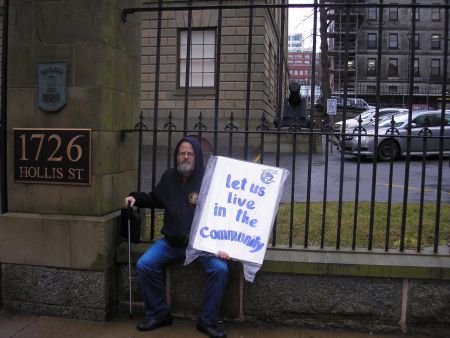KJIPUKTUK (Halifax) - Providing a safe environment for institutionalized people labeled with developmental disabilities remains a challenge for the Department of Community Services.
In just the last three years 76 allegations of abuse were found to have occurred, according to a government response to a Freedom of Information request submitted by the Halifax Media Co-op.
Altogether 168 allegations were investigated. Most happened at facilities for people with developmental disabilities.
That's a lot of abuse, considering we are dealing with a relatively small population of 2,340 persons. It means that one in twenty residents of larger facilities fell victim to abuse in the three year period. Residents of small option homes, with a population of four or fewer residents, fared much better at 1 percent..
Incidents were investigated under the Protection of Persons in Care Act, legislation that makes reporting of such incidents mandatory and grants investigative powers to the Department of Community Services.
Jean Coleman, executive director for the Nova Scotia Association of Community Living is taken aback by the numbers.
She fears that that residents, many with poor communication skills, face an uphill battle when they want to report abuse.
“I think it's the tip of the iceberg,” she says.
These are very vulnerable people, she says, sometimes lacking even elementary communication skills.
She mentions a case a couple of years ago where two staff members were in an altercation with a resident, who suffered a serious injury as a result. Staff were disciplined, but police didn't pursue it because the victim's perceived inability to communicate.
“And what about the folks who are all alone, who don't have any family or other support to push the matter?” she wonders.
David Kent, vice president of People First Nova Scotia, a self-advocacy group for people labeled with an intellectual disability, is upset.
Kent remembers talking to the press about institutional abuse as long ago as 2009. More recently he heard many more such stories during showings of the Freedom Tour of Nova Scotia, a powerful documentary on institutional living.
“It seems nothing has changed since then,” he says.
“That's what happens when you lock people up. Especially when they have no choice and challenging behaviours, and they don't want to live together,” says Kent.
Staff were the perpetrators of the abuse in 32 cases. The remainder involved abuse between residents.
Staff were found to have engaged in physical abuse seven times. Physical abuse can include acts like slapping, hitting, beating, burning, rough handling, tying up or binding, regulations explain.
Nine incidents of emotional abuse by staff were also confirmed. Eight times staff failed to provide adequate care. Other incidents saw staff engage in multiple types of abuse all at once.
One incident of sexual abuse of a resident by staff was also reported. That happened in 2012 at the Brookside Residential Care Facility. That case was referred to the police, the government response notes.
Community Services could not tell us whether staff were disciplined, or if police laid charges in any of the cases. “Any records pertaining to these would be under the custody/control of the relevant police service and residential facility,” writes Lynn Hartwell, Community Services deputy minister.
Kent believes many cases that involve staff are swept under the carpet.
“There are no outside eyes, it's as if the abuse never happened, staff all work together,” says Kent. “I think they should all be charged and put in an institution for a while, and be treated the way they treat the patients.”
Resident-on-resident abuse was also a frequent occurrence during the period.
There were 24 cases of non-consensual sexual activities between residents, 14 cases of physical abuse, and six cases of emotional abuse.
The response also identifies the facility where each case of abuse occurred.
The Kings Regional Rehabilitation Centre and the Kings Adult Rehabilitation Centre with a combined number of 14 verified cases of abuse lead the pack. There are about 200 residents at the Waterville facility.
At the Breton Ability Centre in Sydney there were 10 cases of abuse that were deemed to be founded. About 115 people reside at the Centre. One such case, in 2013, involved a failure by staff to provide adequate care.
The centre’s licence was suspended because of of physical abuse of a 20-year-old resident that occurred in 2010, but management says that things have much improved since then.
The Riverview Adult Residential Centre in Riverton, Pictou County, with about 100 residents, saw eight occurrences. The Quest Regional Rehabilitation Centre in Lower Sackville experienced six confirmed cases over the period. That's a relatively high number, given that the facility only houses 36 residents.
In an email to the Halifax Media Co-op Heather Fairbairn, spokesperson for the Department of Community Services, writes that abuse at care facilities is a very serious matter.
“We all want Nova Scotians in care facilities to be protected and to receive the care they deserve. As a department, we will not tolerate the mistreatment of our most vulnerable citizens. Any complaints, whether against staff or among residents, are thoroughly investigated by a team of trained social workers with expertise in conducting investigations into allegations of abuse,” Fairbairn writes.
“Directives are issued to administrators when matters are identified that must be addressed. We then monitor their progress to ensure that any directives issued are being implemented,” Fairbairn explains.
Follow Robert Devet on Twitter



